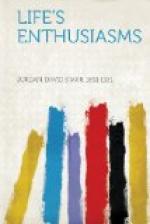And we may look not alone among primitive folk who have never envied us our civilization or ever cared that we possessed it. Badalia Herodsfoot, in Kipling’s story, lived and died in darkest London. Gentle hearts and pure souls exist among our own unfortunates, those to whom our society has shown only its destroying side. All misery and failure as well as all virtue has its degrees, and our social scheme is still far from the demands of perfect justice.
Some one has said that “the wise young man will wear out three dress suits in a year.” This is a playful way of saying that he will not shun men and women, even those bound by the conventions of society. All such association can be made to pay—not in money—but in getting the point of view of other people. This is worth while if not costing too much of time and strength. There is another maxim which can offset the first. It is from Lorimer’s Chicago pork packer: “You will meet fools enough during the day without trying to roundup the main herd of them at night.” But even the main herd of fools may teach its lesson to the student of human nature. It gives at least a point of departure in the study of wisdom. To study men or to kill time. What is your motive? The poorest use of time is to kill it. This is the weakest and most cowardly form of suicide. Moreover it is never quite successful. That “time which crawleth like a monstrous snake, wounded and slow and very venomous” is sure to take its own revenges.
It is therefore good to look on the cheerful side of life. A touch of humor is necessary to the salvation of the serious man. It is a gift of the men of America to see droll things and to express them in droll fashion. To see the funny side of one’s own accomplishments is the highest achievement of the American philosopher and there is hope for the land in which the greatest wits have been the most earnest of moral teachers. Who was more earnest than Oliver Wendell Holmes, who more genuine than Mark Twain? Without the saving grace of humor our Puritan conscience which we all possess would lead us again into all extravagance, witch-burnings, Quaker-stoning, heresy trials, and intolerance of politics and religion. From all these we are saved by our feeling for the incongruous. A touch of humor recalls us to our senses. It “makes the whole world kin.”
In the love of nature is another source of saving grace. Science is power. In the stores of human experience lies the key to action, and modern civilization is built on Science. The love of nature is akin to Science but different. Contact with outdoor things is direct experience. It is not stored, not co-ordinated, not always convertible into power, but real, nevertheless, and our own. The song of birds, the swarming of bees, the meadow carpeted with flowers, the first pink harbingers of the early spring, the rush of the waterfall, the piling up of the rocks, the trail through the forest, the




